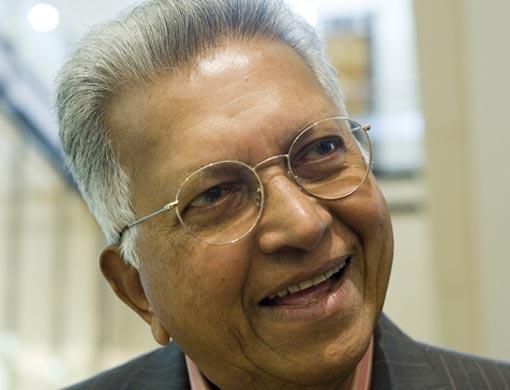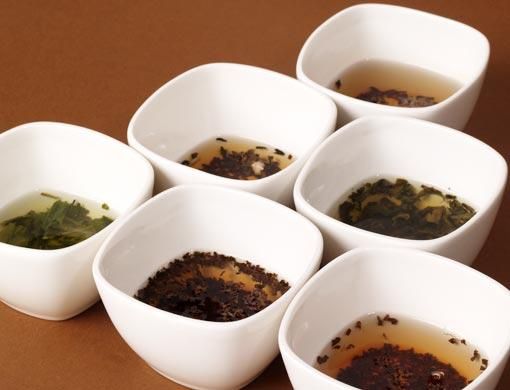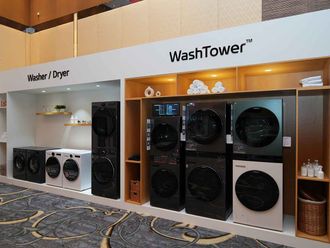Long before fair trade and sustainability were buzzwords for an eco-conscious generation, Merrill J. Fernando was embodying them through his business.
In the '50s, Merrill, founder of Dilmah tea, decided that any business he operated would better the lives of employees, farmers and consumers, and put Sri Lanka's ailing tea industry back on the road to recovery.
Of course at that time, his was just an 18-employee bulk tea business conducted on top of upturned tea chests.
The son of a small-time building materials trader who grew up in a fishing village near Negombo, Merrill was one of the first batch of Sri Lankan tea tasters in the business.
Shocked at the difference in prices paid to growers and what Ceylon tea eventually fetched in the high street, he became the first to cut out the London-based middlemen, start packaging the tea at source and sell it directly to retailers.
While he looks every bit the kindly patriarch, there is no mistaking the steel inside. Merrill took on bigger multinationals ruling the tea business and emerged victorious. Today Dilmah is a $500 million business operating in 82 countries.
It's still very much a family-run operation with Merrill's sons Dilhan and Malik chipping in. Yet after spending a lifetime creating a business empire, Merrill, 78, is now just as busy in his near-retirement giving away his millions to those who need it.
"I strongly believe that we come to this world with nothing, we leave with nothing, and the wealth that we acquire is with the cooperation and commitment of many others," he says.
In '99, Merrill created the Merrill J. Fernando Charitable Foundation. He describes it as his biggest achievement. So far it has helped thousands of people in Sri Lanka's underprivileged communities. As he says simply, "Business is a matter of human service."
I
I coined the name Dilmah, a combination of my sons' names - Dilhan and Malik. I risked every penny I earned to launch Dilmah. When I look back, I realise I took risks I normally wouldn't have.
I have been planning to retire for the past five years, but haven't been able to. Last year, I was forced to on account of my failing health. I was hospitalised in Colombo, Singapore and London. Since then I have made major lifestyle changes.
I now work just 10 per cent of what I used to. This year my goal is to work just one day a week.
I decided to sponsor Sri Lanka's cricket team because cricket, like Dilmah tea, is the only 100 per cent Sri Lankan export! It has worked out well.
My favourite cricketers include Mahela Jayawardene, a very honourable chap, and Sanath Jayasuriya, an excellent batsman and a good human being.
Me
Me and my roots
I was born in May '30 in Allansena village, six miles from Negombo, a fishing town on the coast of Sri Lanka. It was a very devout village.
My father, P. Harry Fernando, was a local trader and our family was of very modest means. We did not have much, yet my mother, Lucih, delighted in giving. Almost every morning villagers would pass our house on their way to the fish market or the shops.
Mother would wait on the verandah, and call out to people to give them something for their children, usually some buns or biscuits.
That image has always stayed with me, perhaps the roots of my charitable work lie there.
I am the youngest of five - three brothers and two sisters. I was treated very kindly since I was the youngest. So much so that on days I didn't go to school, the teacher would come to my house to fetch me.
That was village life at the time. People cared about others. I studied in Negombo and started my career with American Petroleum company as an inspector.
I was hoping to get into law school and be a lawyer. But life had other plans. My sisters still live in the village.
I visit once a year to give away dry rations to about 200 people in memory of my parents. Our Foundation recently donated an icemaking plant so fishermen can preserve their catches.
Me and the tea trade
Sri Lanka was a colony at the time, and the tea trade was closed to Sri Lankans. However I was fortunate to be one of the first batch of six Sri Lankans to be selected for training as a tea taster.
The British took the best tea and marketed it as a brand throughout the UK. Much of the branding and trading of tea was done in Mincing Lane, London, then the cradle of the tea world. Sri Lankan farmers and workers produced the finest tea in the world, but the profits didn't reach them.
In London I saw the truth of the blending, branding and marketing. I was aghast because the tea from Sri Lanka was blended with other teas, marketed and re-exported as Ceylon tea when it was not all Ceylon.
I returned to Sri Lanka and joined A F Jones & Co., a British-owned and managed tea business.
I became its managing director within two years and eventually bought out the British shareholders and ran the business with another partner.
We supplied the first-ever consignment of Ceylon Tea direct to the then USSR. I was still in my twenties when I established my own company – Merrill J. Fernando and Co Ltd.
We supplied bulk tea to most of the world's major tea brands in the '60s and '70s. Soon we were one of the top 10 tea exporters in Ceylon, and the only Sri Lankan owned one to be this successful.
I realised there was a market for blended teas. However the situation in Sri Lanka was worsening. The arrival of the multinational companies in the tea trade had finished off many small operators through acquisitions.
Some companies refused to sell their family businesses for sentimental reasons, but were forced to sell or go bankrupt. The big companies introduced a culture of discounting and cheap prices to eliminate the opposition.
Tea became a commodity. It was not subject to quality, but branding. The trade became concentrated in the hands of three or four big companies.
The multinationals' interests lay in sourcing product from multiple origins regardless of quality and branding.
The state of the plantation workers was terrible. When the commodity trade started, tea prices dropped as there were just a handful of buyers.
Me and my dream
I thought about introducing my own tea to the world, which would give consumers a quality beverage and farmers and workers a fair price. It would be packed at source and the benefits of value addition would flow back into the economy of my own country.
If I were successful, many other entrepreneurs in other countries would follow suit. It could mean the end of poverty. That dream inspired me. The changing conditions of business soon turned in my favour, and the loss of quality and commoditisation had created a niche for my product.
I had the knowledge but no marketing experience. I had
a little money, which I was prepared to risk.
In '88, I finally launched Dilmah in Australia, my favourite market. While the big players wanted to destroy my fledgling brand, consumers loved it.
Shortly thereafter we launched in New Zealand. Today we are represented in 82 countries.
Me and my sons
I was very strict with my sons, but that has paid dividends. The most difficult thing for me as a father was to say 'no'.
Both were educated in England since the age of 11.
When they finished their secondary education, my eldest, Malik, went on to graduate from Boston. Dilhan continued his studies in London.
They have joined me in the business though I didn't think they would. Despite being away from Sri Lanka for so long, I was very keen that they retain their Sri Lankan culture and identity.
Both my sons share my passion, but Dilhan a little more. He has my nature and approach to people. He is doing a tremendous job for the company.
He's improved on my strategies, and leads our marketing division. Together with Malik's skills in administration and finance, they make a good team. Malik has two daughters and Dilhan has two sons and a daughter. My grandchildren will take Dilmah to new heights.
Me and my setbacks
When I bought my first tea plantation in 1971, the new socialist government had been in power for less than a month. Their manifesto said they would nationalise all plantations and take over their assets.
I still went ahead and bought the plantation in Dimbula, and spent huge amounts developing it. I got the highest prices for my tea in the region.
Under the new government's land reform act, no individual could own more than 50 acres.
The government took over my estate, and in two years ran the business into the ground.
At that stage I thought of selling off everything and emigrating to Australia or southern Ireland. But I changed my mind at the last minute. Persuaded by friends, I remained in Sri Lanka.
In '90, the management of tea estates was handed back to the private sector. (About 20-25 years later I was paid a pittance as compensation by the government.)
Me and philanthropy
My greatest comfort today comes from the Merrill J. Fernando Charitable Foundation.
I started by sponsoring the school supplies and uniforms for their children. Today, we do the same for our 1,000 employees.
We also give them scholarships for higher education. Our employees are able to keep debt collectors at bay because of our interest-free loans.
We strongly emphasise staff welfare, which includes in-house medical facilities with free or subsidised medication for staff, financial assistance for the education and basic needs of their children and themselves.
Dilmah will donate more than $500,000 worth of the teapots and mugs to retailers to be sold and proceeds to be donated to local charities this year.
The Foundation will go on to build hospitals, orphanages, homes for the elderly and schools in rural areas where such facilities are not provided by the government.
Myself
Many instantly associate your brand with Sri Lankan cricket since you are team sponsor. What was your reaction to Sri Lanka's cricket board declaring itself bankrupt?
When governments interfere in sports administration, you can be sure things will begin to go wrong. They nominate the people to the board who may not be the right people to do the job.
When they see the huge sums of money associated with cricket, they begin to get ideas. Unfortunately in Sri Lanka's case, the government interferes in everything that works well and sets it back.
That is the problem. The new board is headed by an able chairman and dear friend Arjuna Ranatunga. But he needs a team of able managers and financiers.













